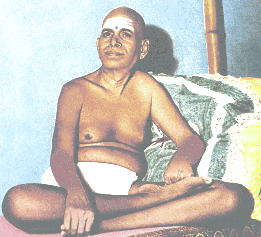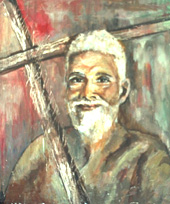|
RAMANA MAHARSHI
THE SAGE OF THIRUVANAMALAI
"What is the use of knowing about everything else when you do not yet know who you are? Men avoid this enquiry into the true Self, but what else is there so worthy to be undertaken?... The only thing that keeps us from realization is the belief that we are not realized..." "Pursue the inquiry 'Who am I' relentlessly. Analyse your entire personality. Try to find out where the I-thought begins. Go on with your meditations. Keep turning your attention within. One day the wheel of thought will slow down and an intuition will mysteriously arise. Follow that intuition, let your thinking stop, and it will lead eventually to the goal." - Ramana Maharishi, quoted in 'In Days of Great Peace' by Mouni Sadhu "Bhakthi, Karma, Jnana and (Raja) Yoga, all these paths are one. You cannot love God without knowing Him nor know him without loving him. Love manifests itself in everything you do and that is Karma. The development of mental perception (Yoga), is the necessary preliminary before you can know or love God..." - Ramana Maharishi quoted in 'Crumbs from his Table' by Ramanananda - "Jnana is given neither from outside nor from another person. It can be realised by each and everyone in his own Heart. The jnana Guru of everyone is only the Supreme Self that is always revealing its own truth in every Heart through the being-conciousness 'I am, I am.' The granting of true knowledge by him is initiation into jnana. The grace of the Guru is only that Self-awareness that is one's own true nature. It is the inner conciousness by which he is unceasingly revealing his existence. This divine upadesa is always going on naturally in everyone." - Ramana Maharshi
|
 From Paul Brunton's A Search in Secret India, published by Rider & Co., London: From Paul Brunton's A Search in Secret India, published by Rider & Co., London:
Q: What exactly is this Self of which you speak? If what you say is true there must be another self in man.
Sri Ramana: Can a man be possessed of two identities, two selves? To understand this matter it is first necessary for a man to analyse himself. Because it has long been his habit to think as others think, he has never faced his 'I' in the true manner. He has not a correct picture of himself: he has too long identified himself with the body and the brain. Therefore I tell you to pursue this enquiry, 'Who am I?' You ask me to describe this true Self to you. What can be said? It is That out of which the sense of the personal 'I' arises and into which it will have to disappear.
Q: Disappear? How can one lose the feeling of one's personality?
Sri Ramana: The first and foremost of all thoughts, the primeval thought in the mind of every man, is the thought 'I'. It is only after the birth of this thought that any other thoughts can arise at all. It is only after the first personal pronoun, 'I', has arisen in the mind that the second personal pronoun, 'you', can make its appearance. If you could mentally follow the 'I' thread until it led you back to its source you would discover that, just as it is the first thought to appear, so it is the last to disappear. This is a matter which can be experienced.
Q: You mean that it is possible to conduct such a mental investigation into oneself?
Sri Ramana: Certainly. It is possible to go inwards until the last thought, 'I', gradually vanishes.
Q: What is then left? Will a man then become quite unconscious or will he become an idiot?
Sri Ramana: No; on the contrary, he will attain that consciousness which is immortal and he will become truly wise when he has awakened to his true Self, which is the real nature of man.
Q: But surely the sense of 'I' must also pertain to that?
Sri Ramana: The sense of 'I' pertains to the person, the body and brain. When a man knows his true Self for the first time something else arises from the depths of his being and takes possession of him. That something is behind the mind; it is infinite, divine, eternal. Some people call it the Kingdom of Heaven, others call it the soul and others again Nirvana, and Hindus call it Liberation; you may give it what name you wish. When this happens a man has not really lost himself; rather he has found himself.
Unless and until a man embarks on this quest of the true Self, doubt and uncertainty will follow his footsteps through life. The greatest kings and statesmen try to rule others when in their heart of hearts they know that they cannot rule themselves. Yet the greatest power is at the command of the man who has penetrated to his inmost depth. What is the use of knowing about everything else when you do not yet know who you are? Men avoid this enquiry into the true Self, but what else is there so worthy to be undertaken? " |
| 
Ramana Mahrishi -
from a painting in oils
by Jayalakshmi Satyendra
| | Ramana Maharishi, Somerset Maugham & Razor's Edge "..In January 1938 Somerset Maugham, the British novelist, visited Sri Ramanashram for a few hours. The brief contact he had with Bhagavan inspired Maugham so much, he decided to use him as the model for a fictional Guru in The Razor's Edge, a novel of his that was published a few years later in 1944. Maugham also wrote a non-fiction account of his visit in an essay entitled 'The Saint', which was published twenty years after the event in 1958..." | | All about The Razors Edge | | The Razor's Edge - Somerset Maugham | | David Godman: Obeisance to Ramana. "By seeing Chidambaram, by being born, in Tiruvarur, by dying in Kasi, or by merely thinking of Arunachala, one will surely attain Liberation. The supreme knowledge (Self-knowledge), the import of Vedanta, which cannot be attained without great difficulty, can easily be attained by anyone who sees the form of this hill from wherever it is visible or who even thinks of it by mind from afar. Such is the assurance given by Lord Siva in the Arunachala Mahatmyam about the power of the mere thought of Arunachala, and this assurance has received striking confirmation from the life and teachings of Bhagavan Sri Ramana. ." | * Be As You Are : The Teachings of Sri Ramana Maharshi - David Godman (Editor) Book Review by Fred Chapur at Amazon.com - "You don't find a book, a book finds you!..Ramana was a true master, He knew that truth could not be put into words, he knew that truth could not be a concept or an idea, he knew that truth was beyond mind, beyond the horizontal plane of existence of apparent beginings and ends so his favorite method was his silent teaching. Silence was his preferred way to communicate truth. Those who needed more than silence, will ask him questions and he will answer. But as always as soon as you use words to explain truth you will encounter that with the same words, on the same answer, some will see beautiful wisdom and others absolute nonsense. That is the power, beauty and mystery that happens when you try to express truth in words.If this book has find you, or even if you are reading this review,realize that there is something you can learn or become aware from this book, because even if you feel you got nothing out of it, that is still something! Read some of the pages from this book, and by doing that, something inside you will tell you yes, there is some beautiful wisdom here, or no, this is a soup of letters and I have no clue what this guy is talking about.
Thanks Ramana, thanks David, thank you for having enough compassion to know that there are fools like myself out there that need more than silence to have at least a taste of what truth is all about! | | |
|